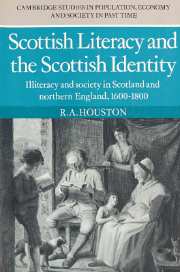 Scottish Literacy and the Scottish Identity
Scottish Literacy and the Scottish Identity Book contents
- Frontmatter
- Contents
- Tables
- Abbreviations
- Preface
- 1 The ideal of Scottish literacy
- 2 Structures and trends in illiteracy in the seventeenth and eighteenth centuries
- 3 Illiteracy in mid seventeenth-century Britain
- 4 The reasons for literacy
- 5 Measures of literacy
- 6 Oral culture and literate culture
- 7 The politics of literacy
- 8 Literacy and the Scottish identity
- Appendices
- Bibligraphy
- Index
4 - The reasons for literacy
Published online by Cambridge University Press: 11 November 2009
- Frontmatter
- Contents
- Tables
- Abbreviations
- Preface
- 1 The ideal of Scottish literacy
- 2 Structures and trends in illiteracy in the seventeenth and eighteenth centuries
- 3 Illiteracy in mid seventeenth-century Britain
- 4 The reasons for literacy
- 5 Measures of literacy
- 6 Oral culture and literate culture
- 7 The politics of literacy
- 8 Literacy and the Scottish identity
- Appendices
- Bibligraphy
- Index
Summary
Describing structures of illiteracy is comparatively easy. Explaining change over time and differences or similarities in the historical development of literacy between Scotland and England, or even between different regions within a country, is more difficult. Historians have conventionally turned to schooling as the main explanation. Because of the political and ideological significance of the school in the nineteenth and twentieth centuries, writers have assumed that it is central to the history of literacy in the pre–industrial period. If one assumes this, and by implication that there is a direct connection between schooling and literacy, then interpretation of structures and trends is fairly straightforward. Indeed, analyses of educational provisions have tended to dominate the literature on British literacy. But the study of schools alone is not likely to provide an adequate explanation of structures and trends in illiteracy. We need to know why schools were provided, but we must also understand why people wanted to be educated. We have already made some suggestions about possible explanations of the profiles of illiteracy encountered in chapters 2 and 3: the role of economic need in different sorts of community, for example. Some remarks were also made about the political context of education and literacy with regard to women and to linguistic minorities, an aspect to which we shall return. The present chapter offers a more detailed and systematic analysis of the reasons why men and women should wish to learn reading and writing. It will try to assess the complexity of motivation and of the process of learning.
- Type
- Chapter
- Information
- Scottish Literacy and the Scottish IdentityIlliteracy and Society in Scotland and Northern England, 1600–1800, pp. 110 - 161Publisher: Cambridge University PressPrint publication year: 1985
